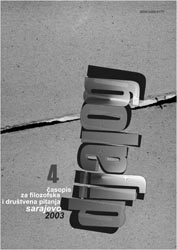
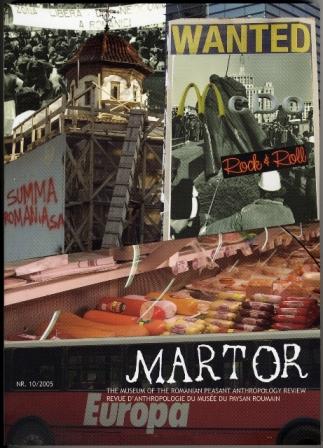
Keywords: postcommunsim; transition; student life; subjectivity; underground rock communities; subculture; hippie; music industry;
I arrived in Bucharest in 1989, when I began my faculty studies; well, it was actually the Agronomics Institute. After graduation, I specialized in naïve music criticism and public and private sound effects. I still work in the field. I’ve lived in Bucharest ever since. What can I say? I was lucky then, as I am lucky now, to find an escape: I lived in underground rockers’ communities with all sorts of weird hippies and interesting people. That was my good luck.
More...
Keywords: freedom; (post)communism; Revolution; Universităţii Square; democracy; violence; solidarity;
I was 20 in June 1990. A wonderful age. I was pretty, young and full of hope. Universităţii Square had taught me a lesson of what freedom and lack of constraints really meant. It had taught me how to laugh, how to cry, how to sing and how to rejoice. How to live during days and nights next to familiar and more often unfamiliar people, a sublime exercise of freedom. Of a ‘we cannot take it anymore’.
More...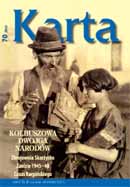
Przedstawiamy dwa listy, których autorzy odpowiedzieli na naszą prośbę o opisanie swego związku z „Kartą”. Dziękujemy. Dominik Kupis opisuje tragiczny incydent z 1946 roku, który charakteryzuje ówczesny stan bezpieczeństwa w Polsce. Aleksandra Malski prosi o pomoc w odnalezieniu informacji o polskim wątku w losach jej brytyjskiego przodka.
More...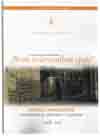
Keywords: II wojna światowa; archeologia; martyrologia; cmentarze polskich oficerów
The political changes in eastern Europe in 1989, allowed the Polish people to take the issue of Polish officers, who disappeared in the Soviet Union during World War II. Also the father of Professor Andrzej Nadolski, colonel Jerzy Nadolski, went missing and latest news from him came from Starobilsk. The Polish authorities have made efforts to initiate the investigation, including the exhumation in places where it was suspected, that bodies of Polish officers are hidden. The investigation was conducted by Soviet prosecutors, assisted by prosecutors and forensic doctors from Poland. Archaeologist, Professor Andrzej Nadolski was invited to research and exhumation in Starobilsk. His participation and observations were very helpful in organizing the subsequent studies of the cemeteries in Kharkov, Mednoye and Katyn.
More...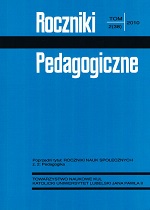
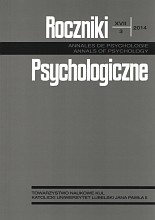
Keywords: psychology; scientific research; publishing; replications; misconduct in science
The author takes up the problem of the condition of psychology as an academic discipline. He narrows down the scope of his reflections to answering four questions concerning the context of the country in which psychology is developed – in this case: Poland. The author answers Question 1 – Does it make sense to speak of any specificity of research carried out by psychologists in Poland? – in the negative. In his opinion, it is possible (and advisable) to speak of the cultural context of psychological practice but not research practice. Psychological cognition is intersubjective and has a global character. The author’s answer to Question 2 – Should psychologists publish (also) in their native language and should they publish their work also in Poland? – is positive. In the context of Question 3 – What indices are used (or should be used) to determine a psychologist’s position in world science? – the author comments critically on the practice of overusing various not always well thought-out bibliometric indices and is in favor of increasing the role of peer review assessments. Answering Question 4 – What conclusions should we draw from the scientific pathologies that have come to light and what should our reaction to those pathologies be? – the author suggests that psychologists should make their raw data available and share them with other researchers so as to make external replications of empirical studies possible.
More...
Keywords: psychology; scientific research; publishing; replications; misconduct in science
The author takes up the problem of the condition of psychology as an academic discipline. He narrows down the scope of his reflections to answering four questions concerning the context of the country in which psychology is developed – in this case: Poland. The author answers Question 1 – Does it make sense to speak of any specificity of research carried out by psychologists in Poland? – in the negative. In his opinion, it is possible (and advisable) to speak of the cultural context of psychological practice but not research practice. Psychological cognition is intersubjective and has a global character. The author’s answer to Question 2 – Should psychologists publish (also) in their native language and should they publish their work also in Poland? – is positive. In the context of Question 3 – What indices are used (or should be used) to determine a psychologist’s position in world science? – the author comments critically on the practice of overusing various not always well thought-out bibliometric indices and is in favor of increasing the role of peer review assessments. Answering Question 4 – What conclusions should we draw from the scientific pathologies that have come to light and what should our reaction to those pathologies be? – the author suggests that psychologists should make their raw data available and share them with other researchers so as to make external replications of empirical studies possible.
More...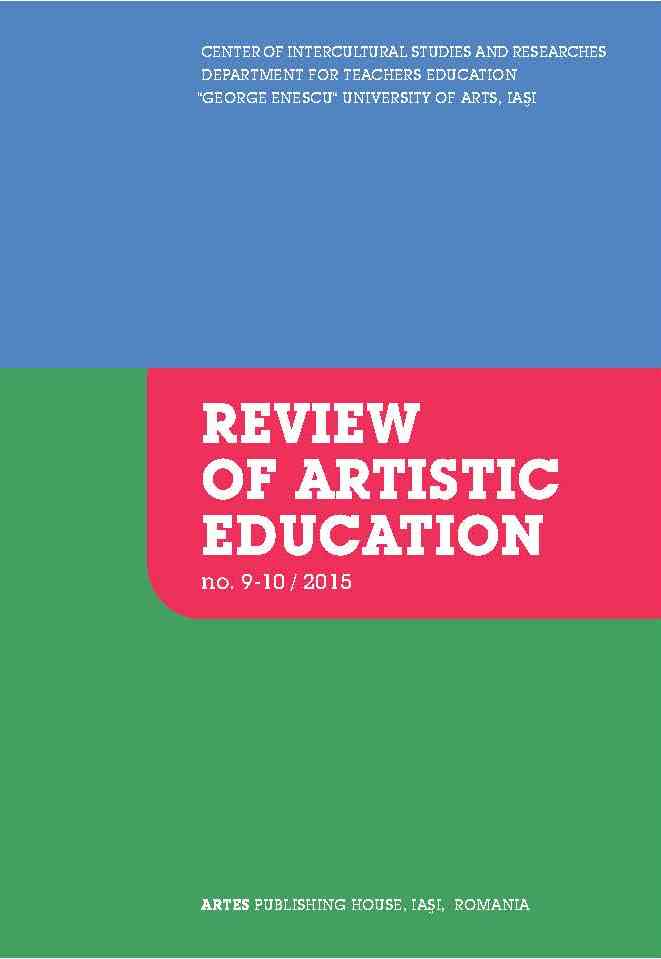
Keywords: man; consciousness; giving; spirituality; word
As we are all aware of, theatre, as opposed to film stands under the spectrum of transience. Every show is unique and cannot be repeated identically. Under this shadow, what steps can the actor take so that his success, if it is a success, doesn’t fade with the fall of the curtain? Moreover, we ask ourselves what are the elements that help the actor continue to be full of energy that he is ready to invest once more, after he has been through the gates of heaven and hell and back? When I came across the topic of this essay, I didn’t expect it to be so difficult of an endeavor. The hardship also stems from the multitude of elements that belong to the privacy of my profession. On the basis of research undertaken by professionals in the area of expertise, as well as on my personal experience on stage, I came to the conclusion that, there isn’t a mandatory need in the actor’s art for certain techniques, for models that he should take on at different stages of his performance. Every actor brings with him a personal technique, and the attempt to acquire a manner different from his own cannot lead to first-rate performances, unless by pure accident. However, the common landmark that actors can rely on is becoming again conscious of the relationship with their own inner being, with their creative self. I believe that, under 21st century’s conditions, people, actors or viewers need more than ever, a theatre that is re-invented, in other words, spiritualized. “The conclusion isn’t all rosy: the theatre isn’t about debating ideas, but is about making energies become manifest, and then you are left asking yourself what can is there to be done so that the energies manifest not as brute expressions of lower impulses, is it not by intellectual refinement? It goes without saying, intuition is a formidable weapon in sensing tension, but without the aid of the mind, it becomes a blind impulse meant to excite impure essences. The result is a theatre of a low vibration, as are most flashy plays nowadays. To dwell in feelings of regret over how low the bar has gone down for acting is a waste of time and a more useful endeavor would be to look for its causes and its remedy”. (Sorin Lavric)
More...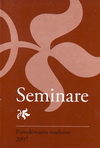
The presented commemorative sketch refers to the figure of the Reverend Professor Marian Lewko depicting him as an outstanding academic teacher thoroughly engrossed in University activi- ties. He perceived his didactic work as pursuit which bore a sense of mission. It evokes the Profes- sor’s flair for conducting classes – always carefully prepared and perfectly taught – and his unri- valled wish to cover the chosen material fully and diligently. The text also underlines the issue of high requirements; both proposed and adhered to. Having been an exceptional documentalist and an insightful analyst, the Reverend Professor himself expected his students to develop the knack for collecting needed materials, to adopt a responsible research approach and not to forget about meti- culousness needed in phenomenon analyses. At the same time, however, the text strongly emphasiz- es the Reverend Lewko’s extraordinary kindliness and his broad perspective on students’ needs. His sensitivity, his proficiency in sharing his knowledge with others together with his deep feeling of satisfaction, stimulated by his students’ successes, should not be forgotten. The unique sense of community present during Professor’s classes created favourable conditions for developing cordial human relations and for establishing close relationships between students and their teachers.
More...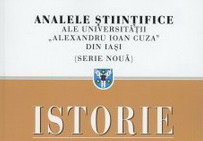
Keywords: Venice; Eastern Mediterranean; Isolario; Ottoman Empire; Renaissance cartography
The main contention of this article is that from the very beginning of the genre to its very end, the Venetian isolarii viewed the Levant as a network of islands fractured by the Ottomans’ conquest. Cartographical narratives of a historical trauma, the Venetian isolarii adopted different strategies for tackling a highly sensitive topic. As the Ottomans were steadily advancing along the Eastern Mediterranean archipelagos, the Venetian cartographers, such as Bartolomeo dalli Sonetti and Benedetto Bordone, were carefully editing the content of their isolarii, expecting from their readers to mentally map the invisible confrontation between the Sultan’s army and the Serenissima. The Lepanto victory brought a radical change of tone, and the mapmakers, such as Tomasso Porcacchi, Giovanni Camocio or Simon Pinargenti, manifestly joined the choir of those who were looking forward to the Venetian resurgence in the Levant. The fracture of the Eastern Mediterranean space was no longer suggested, but visibly exposed. However, it was only a change of tone, as the mapmakers continued to convey the same fundamental ideas. Thus, the Venetian isolarii display a remarkable continuity through time, from its beginnings to the post-Lepanto era and illustrate both the enduring format of this cartographic genre and its adaptability.
More...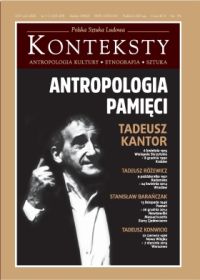
Keywords: Tadeusz Kantor;Jan Kott;theatre;
Jan Kott, Roland Barthes, Susan Sontag, Tadeusz Kantor – four antimodernes of the end of the twentieth century... The theatre of Tadeusz Kantor seen through the book: Kadysz. Strony o Tadeuszu Kantorze by Jan Kott, the last work by this author issued during his lifetime. It remains up to this day one of the most poignant records of what we may describe as “experiencing Kantor” and conceals a fundamental philosophical question: “What can salvage the memory of the theatre: image or Logos–Word? What can save Tadeusz Kantor’s “Theatre of Death”?. The answer proposed by Jan Kott in his Kadysz is: the Tadeusz Kantor theatre can be saved in its essence, while its meaning – only in Logos–Word. This is a truly Biblical solution. Kantor and his Theatre of Death are, and remain up to this day, at odds with all mutations in the domain of art, including performance and video art. One could resort to a formidable abbreviation claiming that Kott’s Kadysz and Kantor outright went against those tendencies. From this vantage point The Dead Class and Wielopole, Wielopole are, to cite Barthes, “the cry of anarchisms, marginalisms, and individualisms: let us abolish the images, let us save immediate Desire”.
More...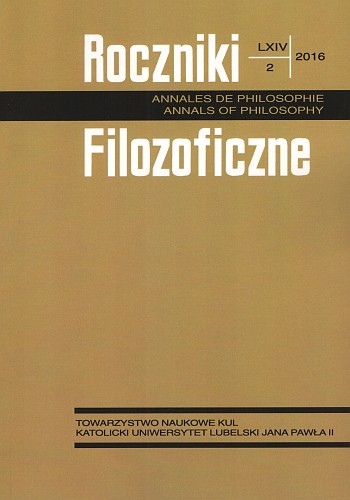
Keywords: language; Krąpiec; dictionary; rules; hyponymy
There is a need of the language to be a proper tool for transferring of all the riches of our thoughts. We consider the abstract thinking as one of the higher activities of human mind. That kind of thinking has its use in the domain of metaphysics. Considerations concerning language as proper for communication in metaphysics became the subject of the work Language and the Real World by Mieczysław Albert Krąpiec. After analysing Krąpiec’s work, one can conclude that natural language requires certain clarifications to be a communication tool corresponding with metaphysics. Well, it would be needed to extract a refined language in the context of the natural language. In order to extract it one would require a description of a dictionary and a definition of the rules for constructing well-formed formulae. After the analyses it turned out that the dictionary of the language in question would be a set of names. In turn syntax rules of that language should be based on a relation defined in the set of names. A relation that would be suitable to formulate these rules is known to linguists as hyponymy.
More...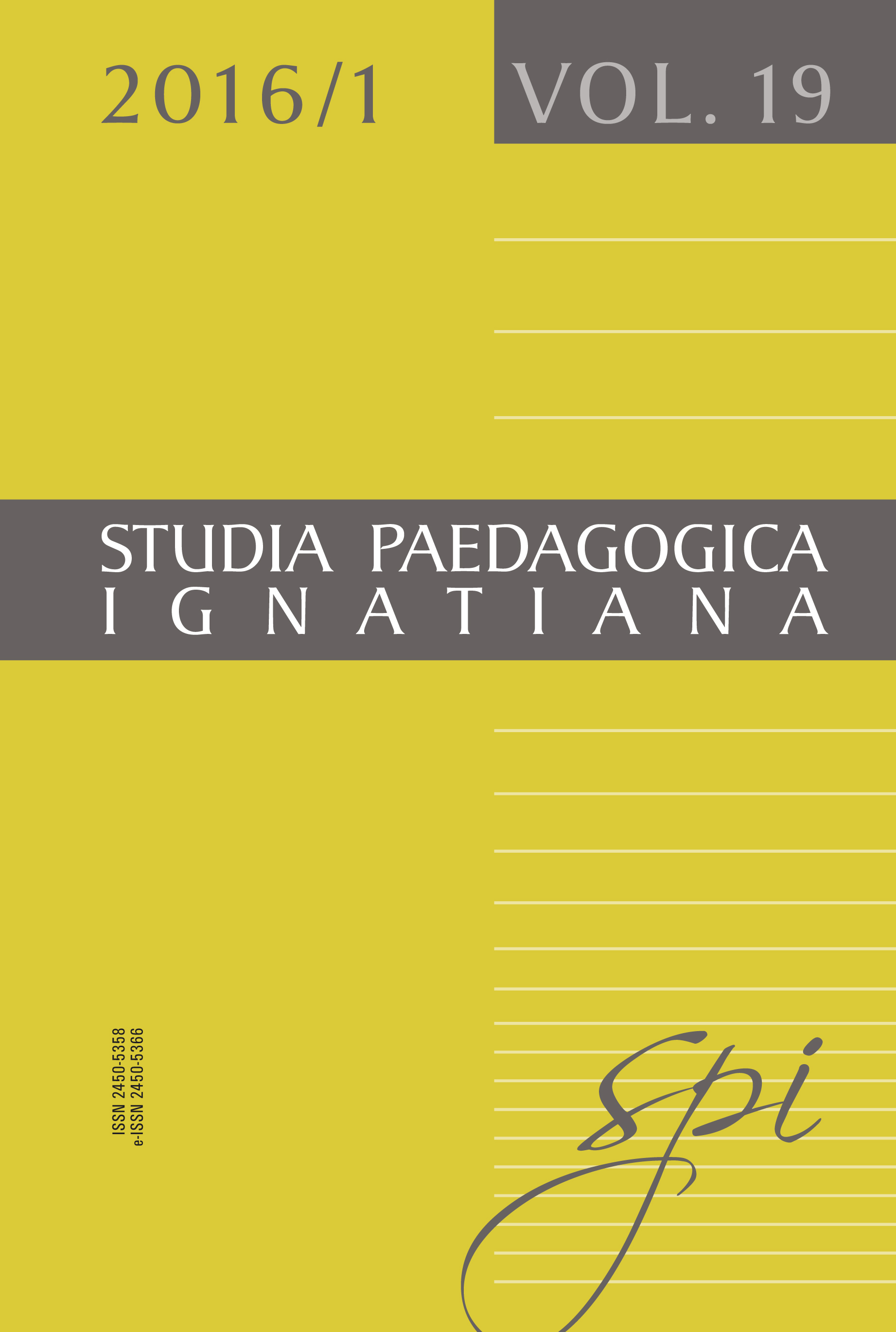

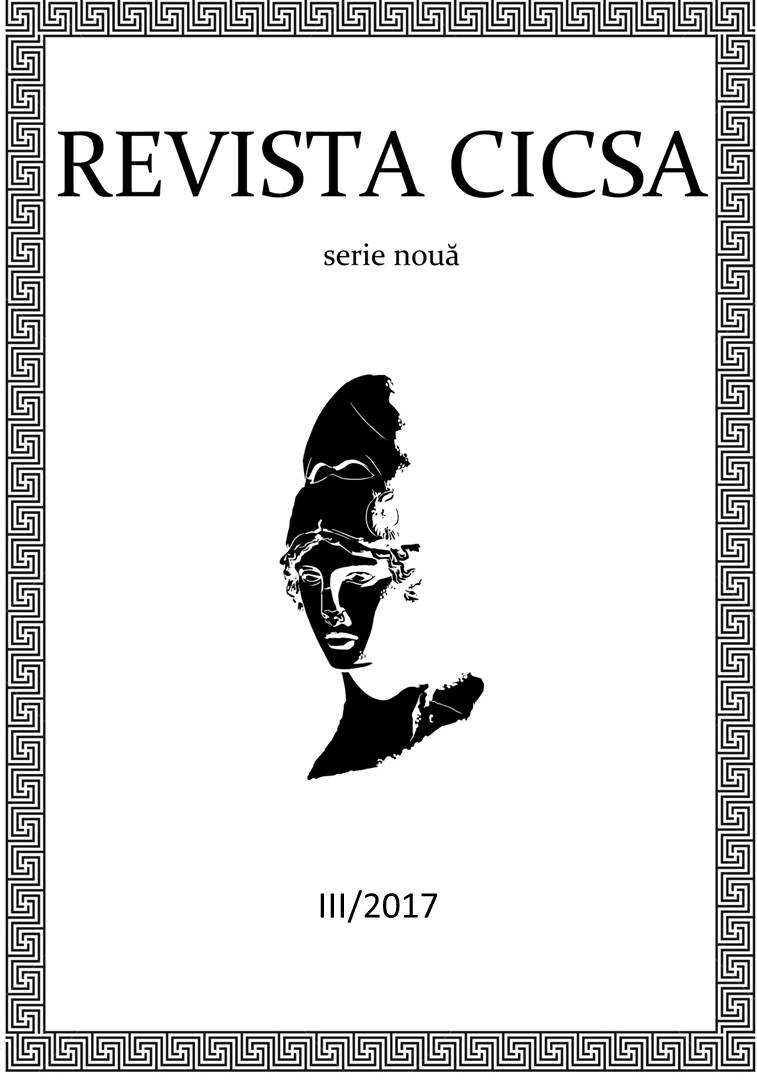
Keywords: military reform; soldier; military booty; siege; sack;
Considering the information that Polybios offers about the warfare in the Roman army, our paper attempts to identify the changes in attitudes that the Roman army had due to the military reform of the Late Republic.
More...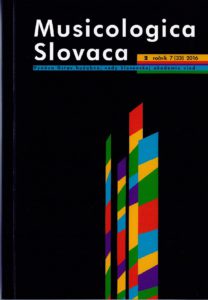
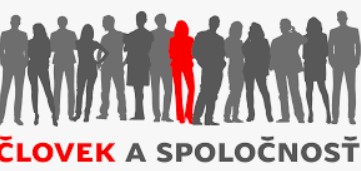
Keywords: ethnic minorities; education; Ukraine; review;
Review of: Ivanenko, O. A. The educational life of ethnic minorities in Dnipro Ukraine: by example of the Kyiv school district between the mid-19th century and early 20th century. Kyiv: Instytut istorii Ukrainy NAN Ukrainy, 2021, 280 p., ISBN 978-966-02-9507-0
More...